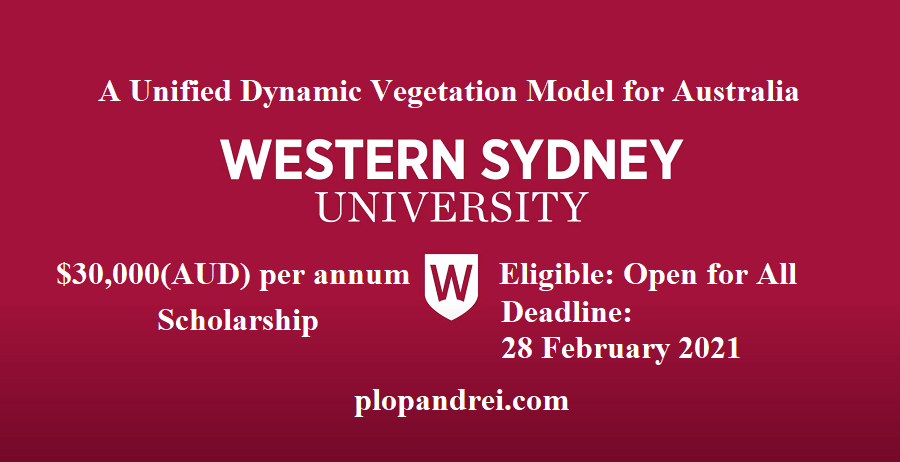
A Unified Dynamic Vegetation Model for Australia
Hawkesbury Institute for the Environment
Lead Researchers: Professor Belinda Medlyn
About the project
Three PhD scholarships are available as part of an Australian Research Council Laureate Fellowship project. The goal of the project as a whole is to synthesise the existing theory and data to develop a quantitative, process-based model of the distribution and function of Australian vegetation. The PhD students will form part of the project team, but will have the opportunity to develop their own programs of research within the overarching project according to their interests and background.
The Australian vegetation is fascinating from a scientific perspective. There are many distinctive genera, such as eucalypts, acacias and spinifex grasses. The evolution and distribution of the vegetation have clearly been shaped by the ancient soils, high temperatures, and low and variable rainfall, but we still have a poor understanding of how these different factors interact – or what to expect as the climate warms. The overall project will draw on theory and evidence spanning physiology, ecology and biogeochemistry to explore and predict Australian vegetation dynamics. The project will also inform efforts to model global vegetation dynamics by adding new understanding of nutrient and water constraints on vegetation distributions.
PhD student projects will focus on one aspect of this overall problem. They could, for example, focus on a particular vegetation process and how it affects different vegetation types; explore the dynamics of a specific ecotone (e.g rainforest/savanna ecotone, shrublands/drylands ecotone); or concentrate on meta-analysis and model development.
The project is connected with many experimental research programs in the Hawkesbury Institute for the Environment, such as the Eucalyptus Free-Air CO2 Enrichment experiment, the NSW Bushfire Hub, the Pastures and Climate Extremes experiment, and the DroughtNet network. Students will be strongly encouraged to work collaboratively on relevant experimental programs.
What does the scholarship provide?
- Domestic candidates will receive a tax-free stipend of $30,000(AUD) per annum for up to 4 years to support living costs, supported by the Research Training Program (RTP) Fee Offset.
- International candidates will receive a tax-free stipend of $30,000(AUD) per annum for up to 4 years to support living costs. Those with a strong track record will be eligible for a tuition fee waiver and Overseas Student Health Care (OSHC)(opens in new window)
insurance (Single Policy).
- Substantial benefits in terms of additional operational funding for project fieldwork and data collection, and travel and conference attendance.
Eligibility criteria
We are looking to build a team with a diverse set of skills. We welcome applicants from a range of backgrounds who are keen to apply their skills to the project topic.
The successful applicant(s) should:
- hold qualifications and experience equal to one of the following (i) an Australian First Class Bachelor (Honours) degree, (ii) coursework Masters with at least 25% research component, (iii) a Research Masters degree, or (iv) equivalent overseas qualifications.
- demonstrate strong academic performance in an area related to the project, such as environmental science (e.g. plant ecology, biogeography, remote sensing) or a quantitative science (e.g. mathematics, computer science, data analysis).
- have strong quantitative skills with some knowledge of computer programming (relevant languages include R, Python, C, and Fortran), and we would be pleased to have applicants with experience in vegetation modelling, maching learning, remote sensing, data assimilation, etc.
- be enthusiastic and highly motivated to undertake further study at an advanced level.
- possess excellent written and verbal communication skills.
- demonstrate being able to work well as part of a team.
International applicants must demonstrate English language proficiency.(opens in new window)
How to apply
Follow the step-by-step instructions on the how to apply for a project scholarship(opens in new window) page.
Incomplete applications or applications that do not conform to the above requirements will not be considered.
For questions and advice about the research project, please contact the Lead Researcher;
Professor Belinda Medlyn: b.medlyn@westernsydney.edu.au
For questions and advice about the application process, please contact the Graduate Research School: grs.scholarships@westernsydney.edu.au.
Applications close 28 February 2021
*Applications close at 11.59pm Australian Eastern Daylight Time (AEDT).
Scholarship reference code: 2020_019_HIE
For more information please open this link



